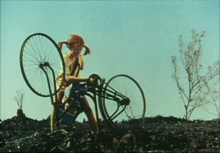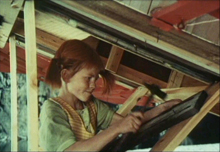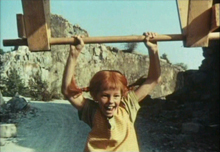2 |
Case |
| |
| |
| |
| Next week there is going to be a new child in your class: a 10-year-old girl. In the transfer file it says she is dyslectic. She is a poor calculator and she has ADHD. Her mother has died and her father cannot take care of her properly. She does not want to go to school.
|
| |
| What are you going to do? |
| |
| By the way.. it is also known that she is very independent and has much enterprising spirit.. And generally she is cheerful |
| |
| What are you going to do? |
| |
| There are video shots available of this girl. For example there are recordings she is walking across a refuse dump together with two friends, where they are collecting all kinds of things. Together they are making a plane that they really get into the air.
But Monday she is coming in your class. |
| |
| What are you going to do? |
| |
| |
| |
| |
| |
| |
| |
| |
| |
| |
| |
| |
| |
| |
| |
| |
| |
| |
| Those are images from the video recordings. |
| |
 |
|
 |
| |
|
|
 |
|
 |
| |
|
|
 |
|
 |
| |
| Probably you will recognize her. And of course she will not come to your class on Monday. But what did you think when you imagined a girl would be coming with her profile. |
| |
| By the way you do know she is dyslectic and a poor calculator (‘three times three is six, whothewhothewho wants to learn from me…’) and believe me the school psychologist would indicate her absolutely as someone with ADHD. That her mother has died and that her father cannot take care of her (for they make the plane to fly to him) is sufficiently known. She went to school once but when she saw through the system she left again with her little monkey and her horse. When the teacher asked how much 5+7 is, she asked if she did not know the answer herself. School was not made for Pippi. |
| |
| Pippi is a lively, independent, cheerful child, driven by challenge and enterprising spirit. And if you read the school plans nowadays you often come across similar terms. Nevertheless Pippi and school have a bad relationship. |
| |
| In my opinion schools – if they want to be able to realize their self written school plans - will have to organize themselves as places where people can discover and develop intensively and meaningfully. They must be places where ‘the Pippi’ emerges in children. |
| |
| Questions like: who are the children with ADHD, the dyslectic, the retarded, the troublesome, lazy and unmotivated children must be bent to questions like: |
| |
| Who are the Pippis in your class? |
| Who ‘manage’? |
| Who can handle complex tasks? |
| Who stand out because of their leadership and enterprising spirit? |
| Who can handle complex tasks? |
| |
| And who are the Tommies and Annikas? |
| Who may have adapted to the system but need others to develop maximally? |
| |
| |
| Pippi may remain young and adventurous for ever and school may use her wisdom to stimulate that in all children. |
| |
“You will always get somewhere.”
(P. Longstocking)
|
| |
| |
| |
| |
| |
|
|





